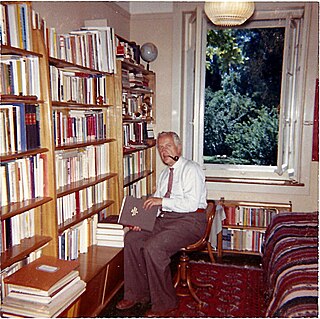
Roman Agrarian History and its Significance for Public and Private Law was the habilitation thesis, in law at the University of Berlin in 1891, of Max Weber, who went on to become a renowned sociologist.

Karl August Wittfogel was a German-American playwright, historian, and sinologist. He was originally a Marxist and an active member of the Communist Party of Germany, but after the Second World War Wittfogel was an equally-fierce anti-communist.
Carl Grünberg was a German Marxist philosopher of law and history.

Hans Martin Sutermeister was a Swiss physician and medical writer, politician, and activist against miscarriages of justice.

Hans Alex Keilson was a German-Dutch novelist, poet, psychoanalyst and child psychologist. He was best known for his novels set during the Second World War, during which he was an active member of the Dutch resistance.

Herbert Wilhelmy was a German geographer. Wilhelmy has made significant impact in the area of Latin American regional geography, with a focus on climatic geomorphology and, especially, morphogenetic urban geography.
The Zeitschrift für deutsches Altertum und deutsche Literatur is a quarterly peer-reviewed academic journal in the field of German studies with emphasis on the older periods. It was established in 1841 and is the oldest periodical in early Germanic studies still publishing.

Edward Schröder was a Germanist and mediaevalist who was a professor at the University of Göttingen and published editions of numerous texts.

Hans Otto Friedrich Schlossberger was a German physician, who was known for his research in immunology, medical microbiology, epidemiology and antimicrobial chemotherapy, especially on syphilis, typhus, gas gangrene, diphtheria, erysipeloid of Rosenbach, tuberculosis, malaria and leptospirosis. He was one of the leading immunologists and bacteriologists of Germany during his lifetime, and was a student and collaborator of the Nobel laureates Paul Ehrlich and Emil von Behring, two of the principal founders of the field of immunology.
Wolfgang Schröder was a German historian. The early decades of his professional career were spent as a member of the East German historical establishment: the focus of much of his work was on the history of the labour movement. He nevertheless remained professionally active and made further important contributions through his published work and teaching during the years after reunification.
Friedrich Lütge was a German economist, social historian and economic historian.

Max Samuel was a German businessman and self-made man, founder and managing-director of the EMSA-Werke, chair of the Jewish congregation in Rostock and head deputy of the Israelite Upper Council of Mecklenburg-Schwerin.
Johannes Kunisch was a German historian. He held chairs of early modern history at the Goethe University Frankfurt. (1972-1976) and the University of Cologne (1976–2002). Through his publications Kunisch became one of the leading German early modern historians. His biography Frederick the Great, published in 2004 and widely acclaimed, gave lasting impulses to Prussian research.
Peter Herde is a German historian. His research activities range from fundamental work on papal diplomacy of the Middle Ages to the history of the country up to the Second World War.
Rudolf Vierhaus was a German historian who mainly researched the Early modern period. He had been a professor at the newly founded Ruhr University Bochum since 1964. From 1971, he was director of the Max-Planck-Institut für Geschichte in Göttingen. He became known for his research on the Age of Enlightenment.
Werner Gustav Rudolf Gößling was a German conductor, Choir director, composer and university lecturer. He was chief conductor of the Philharmonisches Staatsorchester Halle and the Robert Franz Singakademie in Halle. In 1951, he was appointed General Music Director. From 1956 to 1958, he built up the first Chinese symphony orchestra in the European style.
Fritz Reuter was a German musicologist, music educator, composer and Kapellmeister. Reuter was one of the most important German music educators of the 20th century. After studying music and musicology in Dresden and Leipzig, with Teichmüller, Riemann, Schering and Abert, he received his doctorate in 1922. In 1945, he was appointed Kapellmeister at the Volksoper in Dresden. In 1949, he was appointed as the first professor of music education at a German university. He was also director of institutes at the Martin Luther University of Halle-Wittenberg and the Humboldt University Berlin. In 1955, he was one of the initiators of the first Hallische Musiktage.
Rudolf Kötzschke was a German historian who founded the Seminar for Regional History and Settlement Studies in Leipzig, the first regional history institution at a German university.
Angelika Schaser is a German historian.
The Akademische Verlagsgesellschaft in Leipzig was an important German academic publisher, which was founded in 1906.







